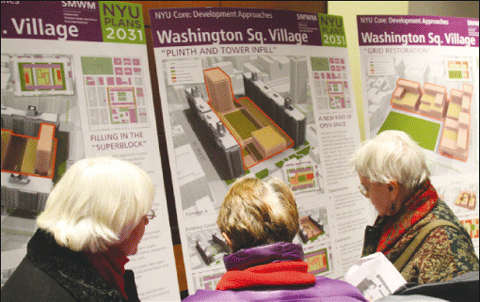BY LINCOLN ANDERSON | New York University on Tuesday said it has reached an agreement on the land lease with the co-op that owns the building at 505 LaGuardia Place, one of the three residential towers on the N.Y.U.-owned South Village superblocks.
Under the deal, the term of the co-op’s current land lease will be extended in perpetuity as long as the building remains in the Mitchell-Lama or other approved affordable housing program. The agreement also limits future rent increases under the lease to allow the building to continue to be affordable.
The co-op’s current lease with N.Y.U. provides for an annual rent payment to the university of $28,400 per year for the land on which the co-op is built. Under that lease, the rent would have been reset in 2014 at 6 percent of the market value of the land, which would have resulted in a substantial rent increase due to the high value of land in the Village.
The new lease agreement will limit future rent increases to keep the building affordable to residents that qualify for Mitchell-Lama housing.
The university did not release specific terms of the lease amendment.
However, a source close to the negotiations, requesting anonymity, told the newspaper, “The rent remains $28,4000 until 2014. It then goes up to $35,400 until 2039. After 2039 it increases by 3 percent per annum for 10 years — until 2049. Then it increases annually by a percentage of cost of living in perpetuity. It is an evergreen lease, meaning that it automatically renews every 25 years in perpetuity absent a disqualifying event, such as leaving Mitchell-Lama.”
Patricia Albin, board of directors president of 505 LaGuardia Place, said on Tuesday, “After a long and difficult process, 505 LaGuardia Place and N.Y.U. have reached an agreement that will guarantee permanent affordability, protect the most vulnerable and remain true to the historic mission of Mitchell-Lama housing.
“The generous terms of this arrangement were arrived at through skillful negotiation and serious compromise,” Albin said. “Thanks for the favorable outcome are due to those outstanding negotiators and to the dedicated elected officials who honored their commitment to support and preserve affordable housing now and into the future. We are grateful to all of those who worked so hard to achieve this remarkable result.”
According to a release issued by N.Y.U., the agreement reflects the university’s commitment to preserve 505 LaGuardia as affordable housing. The lease negotiations were not part of the land use approvals for the N.Y.U. 2031 development plan that will add 1.9 million square feet of new facilities to the superblocks.
The building at 505 LaGuardia Place was constructed in 1964 as part of a three-building complex on the southern superblock along Houston St., which N.Y.U. acquired in 1960. The buildings were designed by Pei Cobb Freed & Partners. Two of the buildings, Silver Towers I and Silver Towers II, house N.Y.U. faculty; the third, 505 LaGuardia, became a co-op under the Mitchell-Lama program and was reserved for affordable housing.
“This agreement preserves 505 LaGuardia as affordable housing into the foreseeable future and demonstrates N.Y.U.’s commitment to work with its neighbors to preserve and improve the Greenwich Village neighborhood,” said Lynne Brown, N.Y.U. senior vice president.
“The importance of protecting and preserving affordable housing cannot be underestimated,” said Councilmember Margaret Chin, who represents the superblocks and part of Greenwich Village. “It is not just a valuable public policy, but is integral to the long-term health and stability of our communities. New York University understands this. I want to thank the university for striking a deal with 505 LaGuardia to ensure that this Mitchell-Lama building remains affordable in perpetuity.
“This is a huge victory for Greenwich Village,” Chin continued. “It guarantees, for all of our lifetimes, that working families and the middle class will have a place to call home in this community. I want to thank New York University and the leadership at 505 LaGuardia for all the hard work, time and effort that went into crafting this arrangement. This is a wonderful example of what can be accomplished when we work together; and it is truly a day for N.Y.U. and the Greenwich Village community to stand tall and be recognized for this substantial achievement.”
Council Speaker Christine Quinn said, “I am pleased a deal has been reached and much-needed affordable housing has been preserved in Greenwich Village. This agreement guarantees that 505 LaGuardia can maintain affordability and that the working-class families who currently reside there will be able to continue to live in the neighborhood they have long called home.”
Congressmember Jerrold Nadler added, “This agreement preserving affordability in perpetuity at 505 LaGuardia is a tremendous victory for the entire Village and for the low- and middle-income residents of the community. I commend N.Y.U. and 505 LaGuardia for working together with my office, Councilmember Chin and Speaker Quinn to achieve this important goal. I am thrilled that we now have an agreement that will protect residents and preserve this vital affordable housing in the heart of Manhattan.”
Scott Stringer, the Manhattan borough president, said, “505 LaGuardia is one of the last bastions of middle-class housing in the Village. I am pleased that the residents of 505 LaGuardia have reached a deal on extending their land lease and hope this deal will ensure their continued affordability in perpetuity.”
Added state Senator Tom Duane, “I applaud Councilmember Chin for negotiating this commitment. I have long held that N.Y.U. must help preserve 505 LaGuardia Place as affordable housing both for the current residents and future generations because of the significant contributions that economic diversity has made to the fabric of the Village and New York City as a whole. I appreciate the university’s decision to ensure that future lease terms with the co-operative, a state-sponsored Mitchell-Lama development, are such that affordability may be preserved.”

































